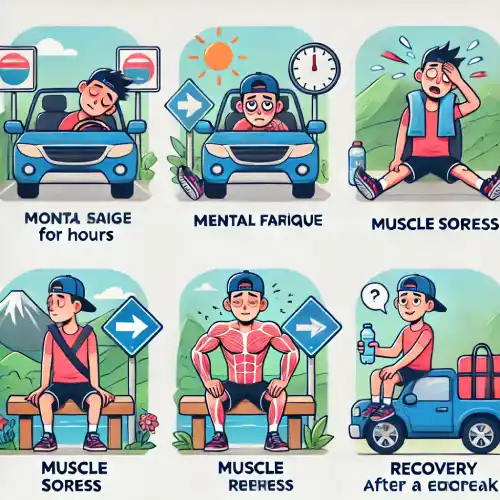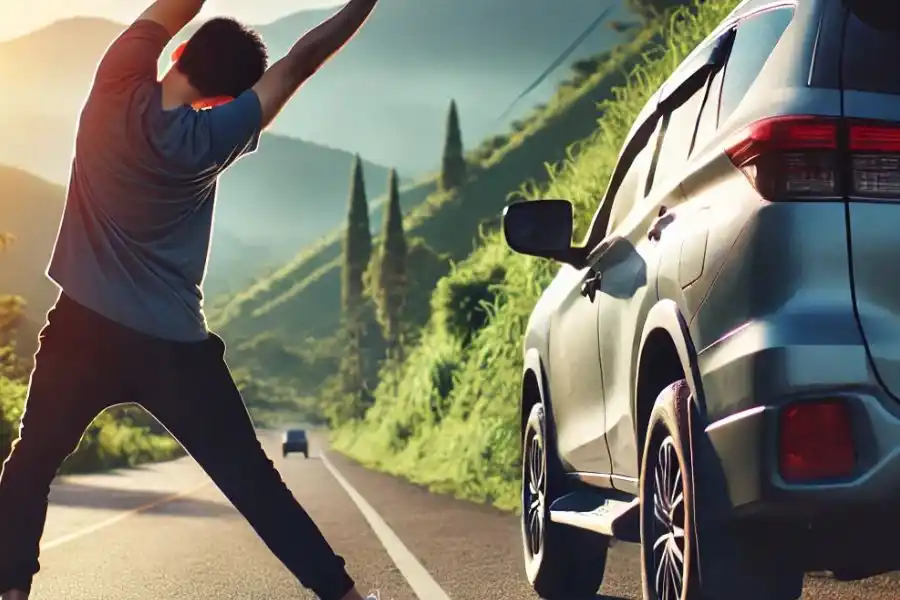Road-tripping for a vacation or heading on an extended commute, long car rides wear and tear on both body and mind. Just a long day on the road can leave you feeling tired or sore or, of all things — bitchy. Once you know what the cause is of your potential long-car-ride-style discomfort, it will give you a heads up to tell yourself that if these symptoms start showing their ugly head again (pardon… pun?), then certain procedures can be done.
This article will jump into the physical and mental toll of long car trips. Next, we are offering sensible tips on how you can decrease your discomfort and giving valuable helpful hints to accelerate the healing experience. Whether it is muscle stiffness or mental exhaustion, learning how to take care of your body after a long drive can help you enjoy road trips more and save yourself some discomfort.
Key Takeaways:
- Long car rides can lead to both physical and mental fatigue, affecting your overall well-being.
- Symptoms like muscle soreness, joint stiffness, and fatigue are common after long periods of sitting.
- Mental symptoms may include irritability, anxiety, and brain fog due to extended focus and lack of stimulation.
- Simple exercises, hydration, and frequent breaks can help ease these symptoms and improve your recovery.
Physical Discomfort After a Long Car Ride
It is natural for your muscles to be tired and joints rigid following long hours of sitting in a vehicle. Humans are not designed to stay in one position for long, so sitting still can cause pain or even actual damage after a while. This restriction of movement during driving causes muscle soreness.
Not moving enough can cause muscle stiffness, especially in parts like the lower back, hips, and legs due to lack of circulation there. It is generally experienced as tight hamstrings, quads, and lower back when we get out of the car. One of the most prevalent problems is hip and knee joint stiffness.
These joints will become stiff and sore since they stay at an angle for long durations of time before you get up and stretch them out. This is because the hip flexors can get pretty tight and end up hurting at your hips or down lower.
Physical Comfort Quick Tips
- Practice extension exercises before, during, and after the trip to stop muscle pains.
- Place a lumbar pillow in your car for better rear support.
- Take breaks every 20 minutes or so to stand up and walk around, pulling your body.
- Make sure that you are consuming the most water potential to help aid circulation and stop muscle cramping.
Fatigue and Sleepiness: The Mental Effects of Long Hours on the Road
Driving long stretches can be exhausting, particularly when you’re behind the wheel and required to stay concentrated the whole time. The repetitive character of highways, mixed with minimal mental motivation, can lead to feelings of fatigue and brain fog. Fatigue doesn’t just cloud your decision, it can also slow your response times and influence decision-making, making driving more difficult.

As you drive, both mental and bodily fatigue build up, leaving you exhausted and unable to focus. The intense focus needed, particularly in serious traffic, can increase anxiety, and when mixed with physical pain, it heightens feelings of crankiness and anxiety.
Solutions:
- Be well-rested before long trips, as rest poverty greatly improves mental exhaustion.
- If possible, switch off going duties with a travel companion.
- Engage your mind by attending to stimulating music or podcasts.
- If you start judging sleepy or sluggish, pull over and grab a short power nap.
Fun Fact: A 2020 National Sleep Foundation study found that 60% of adult drivers have driven while fatigued, and up to one-third have fallen asleep at some point. Prioritizing rest and managing mental fatigue will make you a safer driver.
Why Your Legs May Feel Heavy or Swollen
It may not be a secret why you encounter poor circulation in your legs after spending hours on the road. Staying in one place for too long drives blood to pool in the lower extremities, leading to swelling in the feet, ankles, or legs. This state, known as edema, is more typical in people with circulation issues, like varicose veins.
When you sit or stand for too long, stress builds in your leg veins, making it hard for blood to flow back toward your heart. This generates discomfort and a heavy feeling when you finally stand up. In extreme cases, long sitting can lead to deep vein thrombosis (DVT), a situation where blood clots form in the legs.
Steps for Avoiding Circulation Issues
- Wear reduction socks to improve blood circulation during extended road trips.
- While sitting, move your legs and flex your ankles to keep the blood streaming.
- Elevate your legs when possible and take vacations at rest stops to stretch, which helps reduce bumps.
- Stay hydrated, as dehydration can reduce the blood and raise the risk of clots.
Back Pain: The Effects of Prolonged Sitting on Your Spine
Low back pain is one of the most common complaints following a long road trip. Long hours in the car seat cause a lot of stress to build up on your lower back, especially if there’s no lumbar support to help. Sitting in one position can cause the spine to compress, leading to pain in the lumbar region (lower back). This discomfort can linger for hours after the trip and can even worsen over time if ignored.
To Ease Back Pain
- Buy a quality lumbar cushion or backrest pillow for your car seat to support the arch of your spine.
- Adjust your seat to lean back slightly, ensuring good posture with your hips slightly higher than your knees.
- Perform seated exercises, such as pelvic tilts, to ease strain on your lower back.
- Stretch your legs and back after driving to loosen tight muscles and maintain flexibility.
Did You Know? The American Chiropractic Association released a study stating that 80% of adults will experience back pain at some point, and prolonged sitting is a major contributor.
Mental Effects of Long Car Rides: Anxiety, Boredom, and Irritability
A long-distance car ride can also be hard on your mind’s well-being. Sitting in a car for hours, mostly alone, can lead to lethargy and frustration. This often results from pain, lack of mobility, or being stuck in traffic. Even after getting your goal, stress can negatively affect your attitude post-trip.
How to Deal with Mental Strain:
- Listen to an audiobook, music, or podcast to relax and relieve stress.
- Practice deep breathing practices to calm anxiety.
- Plan your route to avoid roadblocks and detours.
- If traveling with friends, engage in friendly conversation or play road games to lift your spirits.
Dehydration: The Overlooked Factor in Post-Trip Fatigue
It’s straightforward to forget to drink water during a long car ride, but dehydration can contribute to post-trip fatigue and pain. The car’s air movement often acts like an air-drying device, reducing your hydration levels. Dehydration can lead to headaches, muscle cramps, or even dizziness. If you’re feeling sluggish or fatigued after traveling, dehydration could be the reason.
Simple Hydration Tips
- Drink small amounts frequently: Carry a reusable water bottle in the car and sip regularly to stay hydrated.
- Limit caffeine, as it can dehydrate your system.
- On hot days, electrolyte drinks can help replace the minerals lost through sweating.
Practical Tips for Physical and Mental Relief
Once you’ve arrived at your goal, recovery is the key to feeling more good after long hours of driving. Here are some methods to fix your physical and cognitive stamina:
Stretching Routine:
- Concentrate on stretches that target the hips, hamstrings, back, and neck to remove stress.
- Try a soft yoga routine to improve flexibility and increase circulation.
Relaxation Techniques
- Take a generous bath to relax tired muscles.
- The practice develops muscle relaxation to relieve stress and calm your mind.
Rehydration and Nutrition:
- Drink an abundance of water and enjoy a flat meal rich in lean protein and vegetables to refuel your body.
Conclusion
Long car rides can produce a variety of symptoms, from physical discomfort like muscle soreness and back pain to mental fatigue and irritability. By being mindful of what extended sitting does to your body and taking steps—such as regular breaks, stretching, and staying hydrated—you can reduce sluggishness and feel better after your journey.
Post-trip, focusing on gentle stretches, rehydration, and relaxation will help you recover faster. Do you experience any of these symptoms after long drives? Let us know your thoughts or share tips in the comments, and check out our other articles for more ways to enjoy comfortable travel!

